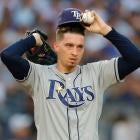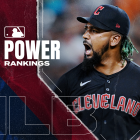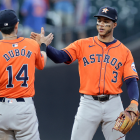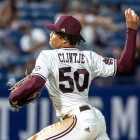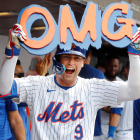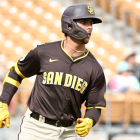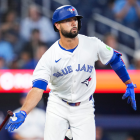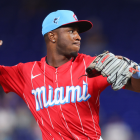In a world without the novel coronavirus, Major League Baseball's season would be nearing its two-month mark. Instead, MLB and the players association are now entering their second week of discussions concerning the potential to play a modified season that would begin in July.
Because there are more pressing matters to worry about on a day-to-day basis, we decided to put together the following guide to the talks. Below, you'll find answers to the four biggest questions (in our opinion, anyway) facing the two sides as they look for common ground.
1. Can a season be played safely?
The CPBL and KBO have shown that it's possible to play baseball in the time of COVID-19, but there are some differences at play. The regions where those leagues are housed (Taiwan and South Korea) have done a better job of containing the coronavirus thanks to more testing and contact tracing. The United States is behind in both regards.
Over the weekend, The Athletic published highlights from MLB's 67-page proposal to the union on safety and testing protocols. The proposal is comprehensive, covering everything from testing to preventive measures, both at the stadium and during travel. The union hasn't accepted the proposal as of Monday morning, and it will have the opportunity to amend the guidelines as desired.
And let's be clear: the players would be taking a risk by playing games, but they would be doing so in exchange for significantly better compensation than some of the other essential personnel taking similar risks: the hotel workers, the cooks, the grounds crew, and so on. Hopefully the weight of that isn't lost on either side.
There's other moral and ethical considerations to ponder, too -- such as whether a sports league should be burning through tests during a pandemic in a country where testing hasn't been as readily available as needed. To be fair, MLB's proposal does note it would acquire the tests from a private supplier, and would offer free testing to essential workers in each team's home market.
2. Will either side budge on revenue sharing?
To the untrained eye, this seems like a poorly timed instance of millionaires fighting billionaires over a large sum of money while an alarming chunk of the country is unemployed. It's more complicated than that, however, in part because it appeared to be a settled issue based on the agreement the two sides reached months ago, closer to the beginning of the pandemic.
The owners have since sought an adjustment to that deal, citing the losses they'll incur from playing games in front of empty stadiums as a reason why the players must accept even greater salary reductions than they previously signed off on. (Why the owners believed fans would be in the stands in the near future is a question in its own right.) The union, predictably, has pushed back on the idea of a 50-50 revenue split.
It's impossible to consider the financial aspect independent of the health matter. The players are the ones who would be exposing themselves (and their loved ones) to COVID-19 by marching onward, so why should they have to make further concessions? The owners, meanwhile, can say they would lose money by playing a season without the players agreeing to further reductions, but it's hard to take them at their word for two main reasons: 1) their reluctance to open their books as evidence; and 2) their steadfast desire to play a season, suggesting it's in their best financial interests to do so.
If that last part is true, then the combination of it and the public pressure on the players -- they always feel more heat than the owners in these disputes for a number of reasons, including the accessibility of their annual pay -- could push the sides toward an agreement.
3. Will any players sit out?
Even if the union and the league reach an agreement on the aforementioned matters, it's not a given that every player will choose to partake. Some, especially those with pre-existing health conditions that would put them at greater risk, may opt to forego the season rather than risk their well-being.
The Athletic's Ken Rosenthal recently interviewed some players from that group, including David Dahl (who had his spleen removed) and a slew of players with Type 1 diabetes. They all indicated they'd be willing to play, provided the proper medical experts signed off on the agreement.
"It's definitely scary ... my immune system is pretty bad," Dahl told Rosenthal. "But I trust the medical experts, the guys with the Rockies, everyone who will be involved that if we do come back and play, we'll be safe and taking the right precautions to make sure we aren't at a greater risk."
There is another matter to touch on here, and it's the risk that could be imposed on the players' families. It's unclear if players will be permitted to bring their partners and children with them, but it stands to reason that individuals will have different definitions of what an acceptable risk is for themselves versus what they consider an acceptable risk for their loved ones.
Given that COVID-19 appears to trigger a Kawasaki-like disease in children, it shouldn't surprise anyone if at least some players decide they would rather not take the chance.
Rays ace Blake Snell outlined more concerns on the players' end last week.
4. Are there any common-ground issues?
It may seem like the two sides are far apart on every issue, but that isn't true. For instance, the players are likely to approve of the universal DH being installed for the season. They're also likely to welcome expanded rosters, among other tweaks, and have already agreed on alterations to the first-year amateur draft, which will happen in June. Of course, those are relatively small beans compared to the two major issues at play, but that just illuminates those topics' importance.









